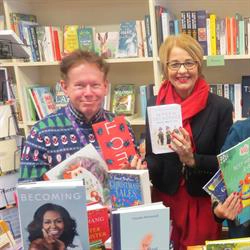
One of the biggest favours we can do ourselves is to learn to read for pleasure, an activity that can make us wiser, smarter, happier and healthier.
One of the most impassioned advocates for reading for pleasure is the writer Neil Gaiman. He gave the second annual Reading Agency lecture in 2013 about the importance of developing a reading culture in a country where we have a shocking literacy problem. The latest report from National Literacy Trust published in 2019 estimates that 5.1 million adults in England are functionally illiterate, meaning that they have a reading age of 11 or below, and can understand only the most straightforward, short texts on familiar topics.
Gaiman suggests that the best way into reading for pleasure is to start with fiction: ‘I’m going to suggest that reading fiction, reading for pleasure, is one of the most important things one can do.' He said that through reading fiction we gain greater empathy, and understanding about the lives of others and he expressed his admiration for “the power of fiction to transform our understanding of the world and turn us into citizens.”
By contrast a lack of access to books, and being cut off from the world, can diminish us as people and almost turn us into sociopaths. He quotes some research done by the private prison industry: "I was once in New York, and I listened to a talk about the building of private prisons - a huge growth industry in America. The prison industry needs to plan its future growth - how many cells are they going to need? How many prisoners are there going to be, 15 years from now? And they found they could predict it very easily, using a pretty simple algorithm, based on asking what percentage of ten and eleven year olds couldn't read. And certainly couldn't read for pleasure. It's not one to one: you can't say that a literate society has no criminality. But there are very real correlations. And I think some of those correlations, the simplest, come from something very simple. Literate people read fiction."
One of my all-time favourite books is Buddha’s Brain: The Practical Science of Happiness, Love and Wisdom by Rick Hanson. He makes a link between ancient contemplative teachings and modern neuroscience in order to demonstrate ways we can use insights into the workings of the mind to effect greater emotional well-being, healthier relationships, more meaningful lives and deepened religious and spiritual understanding. He locates one of the foundations of spiritual and emotional well-being in the core functions of the brain, regulating, learning and valuing, operations that occur automatically in our minds when we are reading. It follows then, that one of the practical ways we can rewire our brains and tap unused potential, is to develop regular reading habits.
The act of reading is good for the brain. Scientific studies have shown that the process of reading stimulates blood flow through the brain and makes our brain healthier and able to function more effectively. So just by going through the motions of reading, irrespective of what we’re actually reading, can make us smarter. Reading a few pages of a book a day can be the equivalent of going to the gym: ‘Reading is to the mind what exercise is to the body’ wrote Joseph Addison.
"Losing oneself in a good book reduces stress and has been proved to be one of the most popular ways to relax"
One of the most popular reading genres is crime and thrillers, stories that have a strong narrative impetus and which invite us to think ahead and try to solve puzzles. This is good for the mind and through detecting patterns, solving puzzles and empathising with different points of view, our analytical skills are strengthened.
Regular reading makes us better writers, by providing us with the opportunity to absorb good writing styles, and increase our vocabulary. Repeated reading of sophisticated styles of writing helps embed them in our minds and we absorb them unconsciously. It also helps us improve our spelling and increases our word power through exposure to new vocabulary. Seeing new words in their natural context, and being able to deduce their meaning from surrounding words, increases our ability to use them in our own writing style.
Through increasing our vocabulary, and our knowledge of how to correctly use new words, we become more articulate in what we want to say. This helps make us more confident in conversation, and by reading more we know more, so we have more to talk about.
Reading books that express different views and perspectives to broaden our minds, and helps shape our beliefs and convictions.
Recent studies on the use of mobile phones and social media have demonstrated that people’s attention spans are getting shorter and shorter. Reading a page of a book is a more focused activity to skimming a web-page, and helps develop the power of focus. Assimilating a page of text forces us to concentrate, and forms deep connections within the brain.
Another very popular contemporary genre is historical fiction, and through reading within this genre, you can develop a more rounded and deeper sense of history, than through reading mainstream history text. Seeing a historical period through the eyes of different characters, can give us a more nuanced sense of the politics, customs, culture and economics of the time than through assessing facts, dates and events.
Reading books from different countries and cultures can widen our perspectives, and see the world from the viewpoint of people we may never meet. It can be a good antidote to travelling all over the globe and it’s also a more Eco-friendly alternative to clocking a thousand miles of carbon footprints.
When we become absorbed in reading, particularly when we enter deeply into the experience of another, it’s almost as if we have had those experiences ourselves. ‘A great book should leave you with many experiences, and slightly exhausted at the end. You live several lives while reading,’ wrote William Styron.
Through reading widely and deeply on subjects which interest us we gain a breadth of knowledge and expertise that can be equivalent of being tutored by the greatest minds on the subject and through reading historical texts on a particular subject we can gather together the wisdom of ages.
Being engaged in reading can be like taking a drug. It makes us feel good and can stimulate endorphins in the body giving us a natural high. This is why, when we read a good book, we feel inspired and optimistic and want to lead a better life.
Losing oneself in a good book reduces stress, and has been proved to be one of the most popular ways to relax. The physical act of reading can ease the tension in your muscles and heart, while releasing your brain from worries and anxiety, by directing your attention to the words on the page. Reading a good book is a very effective way of taking a break from the cares and strains of everyday life.






Share Article